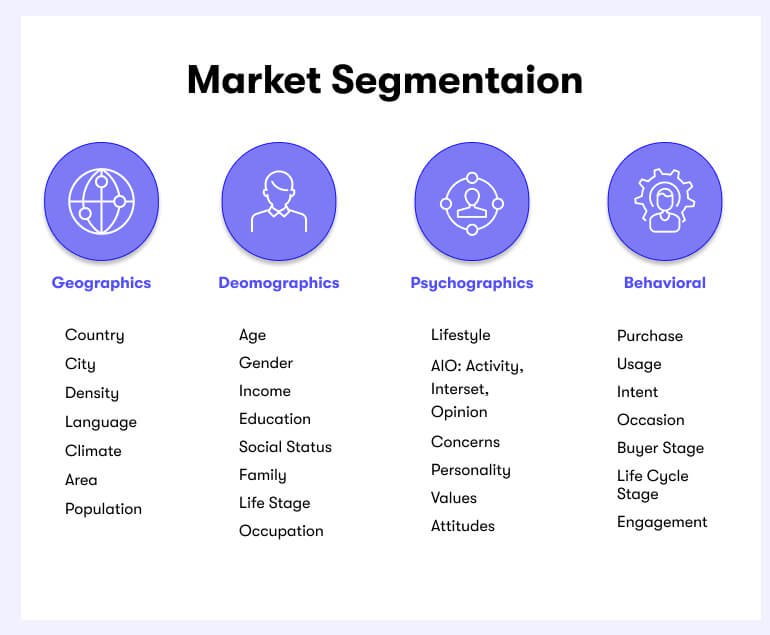Market segmentation: Example, Types, Benefits
Market segmentation is the process of dividing a market into distinct subsets of consumers who have similar needs or wants. This allows businesses to target their marketing efforts more effectively and efficiently.
There are many different ways to segment a market. Some common segmentation variables include:
- Demographic segmentation: This type of segmentation divides the market based on factors such as age, gender, income, education, and marital status.
- Geographic segmentation: This type of segmentation divides the market based on location. For example, a business might target customers in a specific city, state, or country.
- Psychographic segmentation: This type of segmentation divides the market based on personality traits, lifestyle, and values. For example, a business might target customers who are young, active, and health-conscious.
- Behavioral segmentation: This type of segmentation divides the market based on how consumers behave. For example, a business might target customers who frequently buy online or who are brand loyal.
Once a business has segmented its market, it can then choose which segments to target. The ideal target segment is one that is large enough to be profitable, but small enough to be manageable. The business should also consider the needs and wants of the target segment when developing its marketing strategy.
Market segmentation is an important tool for businesses of all sizes. It can help businesses to:
- Identify their target market: Market segmentation helps businesses to identify the group of consumers that they are most likely to sell to. This can help businesses to save time and money by focusing their marketing efforts on the right people.
- Develop a more effective marketing strategy: Market segmentation can help businesses to develop a marketing strategy that is tailored to the needs and wants of their target market. This can lead to increased sales and profits.
- Compete more effectively: Market segmentation can help businesses to compete more effectively with their rivals. By understanding the different segments of the market, businesses can develop strategies to target those segments more effectively.
Overall, market segmentation is a valuable tool for businesses that want to increase their sales and profits. By carefully segmenting their market, businesses can develop a more effective marketing strategy that is tailored to the needs and wants of their target customers.
Here are some additional benefits of market segmentation:
- Increased customer satisfaction: By understanding the needs and wants of different customer segments, businesses can develop products and services that meet those needs. This can lead to increased customer satisfaction and loyalty.
- Improved market share: By targeting the right segments, businesses can gain a larger share of the market. This can lead to increased profits and growth.
- Reduced marketing costs: By targeting specific segments, businesses can reduce their marketing costs. This is because they can focus their marketing efforts on the people who are most likely to be interested in their products or services.
- Improved decision-making: Market segmentation can help businesses to make better decisions about product development, pricing, and distribution. This is because businesses have a better understanding of the needs and wants of their target customers.
Here are some of the challenges of market segmentation:
- It can be time-consuming and expensive to gather the data necessary to segment a market.
- It can be difficult to keep up with changes in the market, which can make segmentation obsolete.
- It can be difficult to target multiple segments with a single marketing message.
- If a business segments the market too finely, it may not be able to reach a large enough audience to be profitable.
Overall, market segmentation is a valuable tool for businesses that want to improve their marketing efforts and achieve their business goals. However, it is important to carefully consider the challenges of market segmentation before implementing a segmentation strategy.





